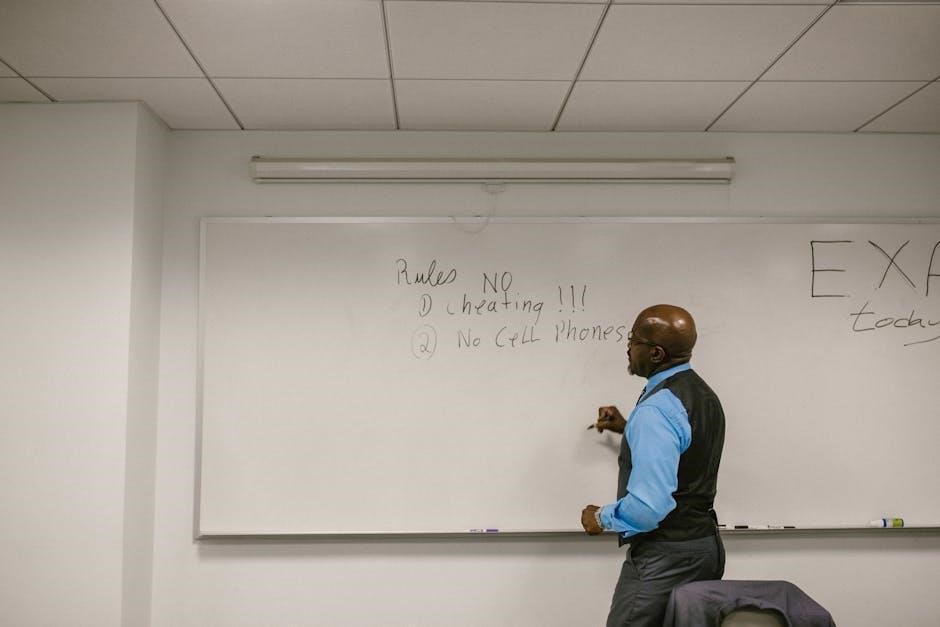nj coj instructions
The Schedule NJ-COJ form is used to claim credits for taxes paid to other jurisdictions. It helps residents avoid double taxation and ensures accurate tax filings. Following the instructions carefully is essential for proper credit calculations and compliance with New Jersey tax laws. This guide provides a comprehensive overview of the process.
1.1 What is Schedule NJ-COJ?
Schedule NJ-COJ, or Credit for Income or Wage Taxes Paid to Other Jurisdictions, is a form used by New Jersey residents to claim tax credits. It applies to individuals who earn income in multiple states or jurisdictions, ensuring they are not double-taxed. The form allows taxpayers to calculate the amount of credit they are eligible for based on taxes paid to other jurisdictions. Completing Schedule NJ-COJ is essential for accurate tax filings and maximizing potential credits. It is typically filed alongside the NJ-1040 form and requires detailed documentation of income and taxes paid elsewhere. Following the instructions carefully ensures compliance with New Jersey tax laws.
1.2 Importance of NJ COJ for Tax Credits
The NJ COJ form is crucial for preventing double taxation on income earned in multiple jurisdictions. It allows residents to claim credits for taxes paid to other states, reducing their New Jersey tax liability. This ensures fair taxation and avoids overpayment. Accurate completion of Schedule NJ-COJ is essential for ensuring compliance and maximizing eligible credits. It simplifies tax filings for individuals with multi-state income, providing a clear process to account for taxes paid elsewhere. This form is vital for maintaining accurate tax records and ensuring residents only pay their fair share of taxes.
1.3 Overview of the Filing Process
The NJ COJ filing process involves several key steps to ensure accurate tax credit claims. First, gather necessary documents, including tax returns from other jurisdictions and proof of income. Next, complete Worksheet I to determine eligibility for the credit. Then, fill out Schedule NJ-COJ, carefully entering income and tax details from other states. Finally, attach the completed schedule to your NJ-1040 form. The process ensures that taxes paid to other jurisdictions are properly credited, avoiding double taxation. Attention to detail is crucial to prevent errors and delays in processing. Proper documentation and adherence to instructions are vital for a smooth filing experience.

Eligibility Criteria for NJ COJ
Eligibility for the NJ COJ credit depends on residency status, income type, and taxes paid to other jurisdictions. Residents and part-year residents may qualify if they paid taxes to another state. Specific income types are eligible for the credit, and proper documentation is required. Understanding these criteria ensures accurate filing and avoids errors. Consult the instructions for detailed requirements and restrictions.
2.1 Who Qualifies for the Credit?
Residents and part-year residents of New Jersey who paid income or wage taxes to another state or jurisdiction may qualify for the NJ COJ credit. Full-year residents are eligible if they paid taxes to another jurisdiction on income taxable by New Jersey. Part-year residents qualify based on income earned during their residency period. Individuals must have properly filed their New Jersey tax return and paid taxes to another jurisdiction to claim the credit. Specific documentation is required to verify eligibility. The credit helps avoid double taxation by allowing taxpayers to offset taxes paid elsewhere against their New Jersey tax liability.
2.2 Types of Income Eligible for the Credit
Income eligible for the NJ COJ credit includes wages, salaries, self-employment income, and other earnings taxable by New Jersey and another jurisdiction. Taxpayers must ensure the income is subject to tax in both New Jersey and the other jurisdiction. Residents and part-year residents must allocate income based on residency periods. Income taxed by another state but not New Jersey does not qualify. Consult the instructions for specific details on eligible income types and allocation methods to ensure accurate reporting and avoid errors in claiming the credit. Proper documentation is required to verify income eligibility and tax payments to other jurisdictions.
2.3 Residency Requirements
Residency status plays a critical role in determining eligibility for the NJ COJ credit. Full-year New Jersey residents must have paid taxes to another jurisdiction on income also taxable by New Jersey. Part-year residents must allocate income based on residency periods. The instructions specify that only income taxed by both New Jersey and another jurisdiction qualifies. Non-residents are not eligible for the credit. Proper documentation of residency and tax payments is essential. Failure to meet these requirements may result in denial of the credit. Consult the guidelines for detailed residency criteria to ensure compliance and accurate credit claims.

Preparation Steps for Filing NJ COJ
Gather all necessary documents, including W-2 forms and tax returns from other jurisdictions. Review Worksheet I in the NJ-1040 instructions to ensure accurate calculations. Complete Schedule NJ-COJ carefully, following the provided guidelines to avoid errors.
3.1 Gathering Necessary Documents
To accurately complete Schedule NJ-COJ, gather all relevant documents. This includes W-2 forms showing income and taxes withheld, as well as tax returns from other jurisdictions. Ensure you have proof of taxes paid to other states, such as canceled checks or Form W-2. Additionally, collect any income statements and tax payment receipts related to out-of-state earnings. Review Worksheet I in the NJ-1040 instructions to identify specific requirements. Organize these documents to streamline the filing process and verify their accuracy to avoid errors. Having all materials ready ensures compliance with New Jersey tax regulations and simplifies the calculation of your credit.
3.2 Understanding Worksheet I in NJ-1040 Instructions
Worksheet I in the NJ-1040 instructions is essential for determining eligibility for property tax deductions or credits. It helps calculate the taxable income subject to New Jersey taxes and adjusts for taxes paid to other jurisdictions. Complete this worksheet before filling out Schedule NJ-COJ to ensure accurate credit calculations. Worksheet I requires detailed income information, including wages, business income, and other earnings. Properly accounting for taxes paid to other states ensures compliance with New Jersey tax laws. Follow the instructions carefully to avoid errors in your calculations. This step is crucial for part-year residents and those with multiple income sources. Accuracy here directly impacts your credit eligibility and amount.
3.3 Completing Schedule NJ-COJ
Completing Schedule NJ-COJ requires precise details about taxes paid to other jurisdictions. Use Worksheet I to calculate taxable income and ensure accuracy. Fill in Column A with your income tax liability and Column B with taxes paid to other states. The credit is calculated as the lesser of taxes paid to other jurisdictions or your New Jersey tax liability. Double-check all entries to avoid errors. Attach required documentation, such as W-2 forms or tax returns from other states. Accurate completion ensures proper credit calculation and compliance with New Jersey tax laws. Follow instructions carefully to maximize your credit and avoid delays in processing.

Filing Schedule NJ-COJ
Enclose Schedule NJ-COJ with your NJ-1040 return to claim credits for taxes paid to other jurisdictions. Verify calculations to ensure accuracy and avoid common errors. Proper filing ensures compliance and timely processing of your tax credit. Always review instructions carefully before submission.
4;1 Column A: Income Tax Liability
Column A in Schedule NJ-COJ represents the income tax liability as calculated on your New Jersey tax return. This amount is derived from your taxable income reported on Form NJ-1040. Ensure the figure in Column A matches the tax liability before credits, as outlined in Worksheet I of the NJ-1040 instructions. For part-year residents, only the income taxed by New Jersey during residency should be included. Accurate reporting in Column A is crucial to avoid discrepancies and ensure the correct credit calculation. Refer to the instructions for specific guidance on calculating this amount. Proper documentation supports the accuracy of your claim. Always verify your calculations to prevent errors.
4.2 Column B: Taxes Paid to Other Jurisdictions
Column B in Schedule NJ-COJ is used to report the taxes paid to other jurisdictions, such as other states. This ensures no double taxation on the same income. Enter the actual tax liability paid to each jurisdiction, supported by proofs like W-2 forms or the other state’s tax return. Each jurisdiction must be listed separately to avoid errors. New Jersey allows a credit for taxes paid to other states to prevent double taxation. Ensure the amounts reflect only the taxes paid on income also taxed by New Jersey. Accurate reporting in Column B is essential for calculating the correct credit. Always attach required documentation to avoid delays in processing. Verify all entries for accuracy.
4.3 Calculating the Credit Amount
The credit amount is calculated by subtracting Column B (taxes paid to other jurisdictions) from Column A (New Jersey tax liability). This ensures no double taxation. Use the formula: Credit = Column A ⏤ Column B. Enter the result on Line 10 of Schedule NJ-COJ. Ensure all values are accurate and supported by documentation, such as W-2 forms or tax returns from other jurisdictions. Part-year residents must adjust their calculations based on residency periods. The credit cannot exceed the total tax liability. Always verify calculations to avoid errors. Attach required proofs to support the claimed credit. This step ensures compliance with New Jersey tax regulations. Proper documentation is essential for a smooth process.

Special Instructions for Part-Year Residents
Part-year residents must allocate income and taxes paid based on residency periods. Special rules apply to avoid double taxation. Ensure accurate documentation for proper credit calculations.
5.1 Allocating Income for Part-Year Residency
For part-year residents, income must be allocated between New Jersey and other jurisdictions based on residency periods. Use Worksheet I to determine the taxable income for each period. Ensure accurate documentation of residency dates and income sources. Proper allocation prevents double taxation and ensures compliance with New Jersey tax laws. Follow the instructions carefully to avoid errors in calculating taxable income for each jurisdiction.
5.2 Adjusting Taxes Paid to Other Jurisdictions
For part-year residents, adjusting taxes paid to other jurisdictions involves calculating the portion of taxes applicable to each residency period. Use Worksheet I to allocate income and taxes between New Jersey and other jurisdictions. Ensure accurate documentation of taxes paid to avoid double taxation. Properly prorate taxes based on residency periods to ensure compliance with New Jersey tax laws. Carefully follow the instructions to avoid errors in tax calculations and ensure accurate reporting of taxes paid to other jurisdictions.
5.3 Property Tax Deduction vs. Credit
Part-year residents must choose between a property tax deduction and a credit. The deduction reduces taxable income, while the credit directly reduces tax liability. To determine which is more beneficial, complete Schedule NJ-COJ and Worksheet I. The property tax deduction is often more advantageous for higher-income individuals. However, if taxes paid to other jurisdictions are significant, the credit may provide greater relief. Carefully review the instructions to ensure proper allocation and compliance with New Jersey tax laws. Proper documentation and accurate calculations are essential to maximize benefits and avoid errors in claiming either the deduction or credit.

Handling Multiple Jurisdictions
When dealing with multiple jurisdictions, ensure proper allocation of income and taxes paid to avoid double taxation. Maintain accurate documentation for each jurisdiction to support claims.
6.1 Combining Income from Multiple States
When income is earned in multiple states, it is essential to properly allocate and report it to avoid double taxation. Taxpayers must list each jurisdiction separately, ensuring accurate reporting of income and taxes paid. Do not combine income taxed by the same state across multiple periods. Instead, calculate taxes for each jurisdiction individually and document accordingly. This ensures compliance with tax laws and prevents overpayment. Proper allocation also helps in claiming the correct credit amount on Schedule NJ-COJ. Always refer to the specific instructions for each state to maintain accuracy and avoid errors in your tax filing process.
6.2 Avoiding Double Taxation
Schedule NJ-COJ helps prevent double taxation by allowing taxpayers to claim credits for income taxed by multiple jurisdictions. Ensure accurate reporting of income and taxes paid to each state. Properly allocate income to avoid double counting. Follow specific instructions for each jurisdiction to maintain compliance. Failure to adhere to guidelines may result in overpayment or eligibility issues. Always verify calculations and cross-reference with tax returns from other states to ensure accuracy. This step is crucial for maintaining tax compliance and minimizing financial burdens. Double-check all figures before submission to avoid errors and ensure proper credit calculations.
6.3 Documentation Requirements
When filing Schedule NJ-COJ, ensure all required documentation is enclosed. Include copies of tax returns from other jurisdictions, proof of taxes paid, and W-2 forms. Accurately detail income sources and taxes paid to avoid discrepancies. Maintain records of all filings and calculations for audit purposes. Ensure documentation aligns with New Jersey tax laws and jurisdiction requirements. Incomplete or inaccurate submissions may delay processing. Always verify that all necessary forms and proofs are included to support your credit claim. Proper documentation ensures compliance and prevents potential issues with your tax filing.

Submission and Verification
Enclose Schedule NJ-COJ with your NJ-1040 form. Verify all calculations for accuracy. Double-check for common errors to ensure proper processing of your tax credit claim.
7.1 Enclosing Schedule NJ-COJ with NJ-1040
When submitting your New Jersey tax return, ensure Schedule NJ-COJ is properly enclosed with Form NJ-1040. This ensures your credit claim is processed accurately. Attach the completed schedule to the front of your NJ-1040 for proper handling. Failure to include it may result in delays or denial of your credit. If filing electronically, upload Schedule NJ-COJ as part of your NJ-1040 submission. Always verify that all required documents and forms are included to avoid processing issues. Proper inclusion helps maintain compliance and ensures timely credit application.
7.2 Verifying Calculations
Verifying your calculations on Schedule NJ-COJ is crucial to ensure accuracy and avoid delays. Always cross-check your entries with Worksheet I in the NJ-1040 instructions. Double-check that Column A and Column B figures align with your tax liabilities and payments. Ensure all mathematical computations are correct, as errors can lead to processing delays or denied credits. Use tax software or consult a professional if unsure. Reviewing your work helps prevent oversights and ensures compliance with New Jersey tax regulations. Accurate calculations are essential for a smooth filing process and to maximize your credit eligibility.
7.3 Common Errors to Avoid
Common errors on Schedule NJ-COJ include incorrect entries in Columns A and B, mismatched tax payments, and miscalculations of the credit amount. Ensure income allocations and tax payments are accurately reported. Avoid combining income taxed by multiple jurisdictions improperly. Double-check that all required documentation, like W-2 forms and tax returns from other states, is enclosed. Incorrect use of Worksheet I can also lead to errors. Neglecting to verify calculations may result in denied credits or processing delays. Carefully following the instructions and reviewing your form can help prevent these issues and ensure a smooth filing experience.
Frequently Asked Questions
Frequently asked questions about Schedule NJ-COJ address electronic filing, correction of mistakes, and credit processing times. Electronic filing is available for NJ-1040, including Schedule NJ-COJ. If errors occur, amended returns can be filed. Processing times vary but typically take 4-6 weeks. Visit official resources for more details and assistance.
8.1 Can I File NJ-COJ Electronically?
Yes, you can file Schedule NJ-COJ electronically. The New Jersey Online Filing Service supports electronic submission of the NJ-1040 return, including Schedule NJ-COJ. This method is efficient and reduces errors. TurboTax and other tax software also automatically fill out Schedule NJ-COJ correctly. Before filing, ensure all required documents, such as W-2 forms and proof of withholding, are attached. Electronic filing is recommended for faster processing and to avoid mailing delays. Visit the official New Jersey tax website for detailed instructions and to access the online filing platform. This option streamlines the process and ensures compliance with state tax requirements.
8.2 What if I Made a Mistake on Schedule NJ-COJ?
If you made a mistake on Schedule NJ-COJ, you can correct it by filing an amended return using Form NJ-1040X. Include a revised Schedule NJ-COJ with the correct information. Attach supporting documents, such as W-2 forms or proof of tax payments, to ensure accuracy. Clearly explain the changes on the amendment form. Submit the amended return as soon as possible to avoid delays in processing your credit. For guidance, refer to the New Jersey tax instructions or contact taxpayer assistance. Corrections are typically processed within a few months. Always double-check your entries before filing to minimize errors and ensure compliance with state tax requirements.
8.3 How Long Does It Take to Process the Credit?
The processing time for the NJ-COJ credit typically ranges from 8 to 12 weeks, depending on the complexity of the return and the accuracy of the submitted documents. E-filed returns are generally processed faster than paper filings. Delays may occur if errors or incomplete information are found during review. To avoid delays, ensure all forms, including Schedule NJ-COJ, are filled accurately and supported by necessary documentation. You can check the status of your credit online through the New Jersey State Treasurer’s website. If issues arise, contact taxpayer assistance for clarification or follow-up. Always allow sufficient time for processing before inquiring about the status of your credit.

Additional Resources
Access New Jersey’s official tax website for detailed guides. Utilize taxpayer assistance programs for personalized help. Explore online filing services and contact support for further guidance and resources.
9;1 New Jersey Taxpayer Assistance
New Jersey offers comprehensive taxpayer assistance to help residents navigate tax-related matters. Visit the New Jersey Division of Taxation website for detailed resources, including guides, forms, and FAQs. Taxpayers can also contact the NJ Taxpayer Assistance Center at 1-609-292-6400 for personalized support. Additionally, regional tax offices are available across the state to provide in-person assistance. Utilize these resources to resolve queries about Schedule NJ-COJ, tax credits, or filing procedures. For further guidance, explore the NJ Taxpayer Portal, which offers self-service tools and updates on tax law changes.
9.2 Online Filing Services for NJ-1040
Online filing services simplify the process of submitting your NJ-1040 and Schedule NJ-COJ. Platforms like TurboTax, H&R Block, and TaxAct offer guided tools to ensure accuracy. These services automatically calculate credits, including the COJ credit, and handle complex filings. For New Jersey residents, the state provides a free online filing service for eligible taxpayers, making it easier to file accurately. These platforms reduce errors and save time, especially for those claiming credits for taxes paid to other jurisdictions. Utilize these resources to streamline your tax filing process and ensure compliance with New Jersey tax requirements.
9.3 Contact Information for Support
For assistance with Schedule NJ-COJ or NJ-1040, contact the New Jersey Division of Taxation at 1-609-292-6400. Visit their official website at https://www.nj.gov/treasury/taxation for resources and FAQs. Taxpayers can also access live chat support or submit inquiries online. Additionally, local tax offices are available for in-person assistance. For specific NJ COJ questions, refer to the detailed instructions provided in the NJ-1040 booklet or consult a tax professional. Ensure compliance by leveraging these support channels to address any filing concerns accurately and efficiently.